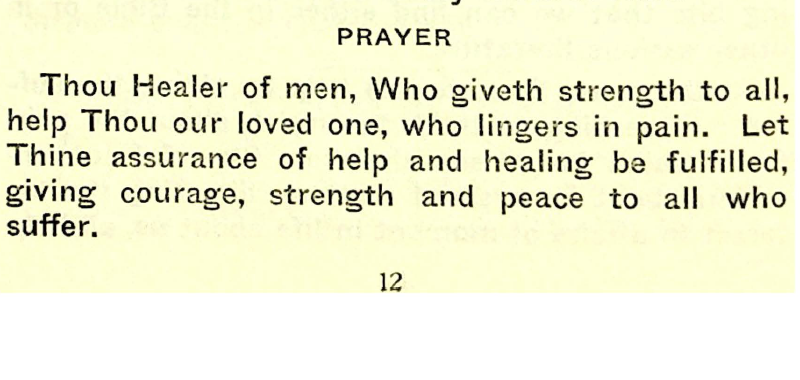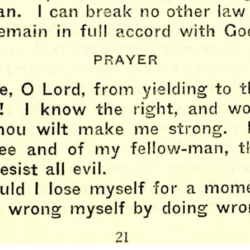BRINGING HEALTH TO THE HOME
When one who is near and dear to us lies on the bed of pain, how can we help? If we are cheerful, hopeful, confident, and spread the atmosphere of trust and courage around us we are working in accord with the law of God and helping the sufferer back to health and happiness. To manifest sympathy is to lower the morale of the sufferer, and that is precisely the opposite of our purpose.
We must express in word and action the certainty that all will be well, and that as the one who is ill regains self-control, and helps the physician or surgeon by hearty cooperation the healing will come all the more speedily. It must be no pretense. If we develop real faith in ourselves we communicate it to all around us and out of this faith comes the sureness, the confidence of health.
We help to alter the attitude of mind of the sick persons, by giving them the finer outlook and the deeper hope. We help them to that calm within which comes from the sureness of the aid of God, when we are working with His laws, and not against them. We read the most uplifting and encouraging bits that we can find either in the Bible or in other serious literature.
At the same time we can help by aiding the sufferer in ceasing to think too much about the pain from which he or she shrinks. Cheerful conversation about impersonal maiters, directing the interest to affairs of moment in life about us, all help to bring the patient back to a normal, happy state of mind, which must aid in restoring the calm and self-control which they need.
We descend into the ‘‘valley of the shadow of death” with our loved ones who are prostrated by severe illness, but we raise them up with ourselves when we see clearly that “God is our stay and our staff.” There is the support which we need and there it may be found always. There is more than comfort—the stimulus to higher thinking and a surer hold upon God.
Flowers, music, all things cheerful and delightful, help, if the patient can be led to manifest interest, and even subconsciously the effect of music is felt. Our own effort to raise the atmosphere of the sick-room to one of cheer and hope inspires us to renewed effort, as well as helping the sufferer. We fail only if we are too dull to understand that God works thus upon and through us if we are in accord with His laws and look steadily towards Him.
| Contribute a translation | Source (English) |
|---|---|
Thou Healer of men, Who giveth strength to all, help Thou our loved one, who lingers in pain. Let Thine assurance of help and healing be fulfilled, giving courage, strength and peace to all who suffer. | |
May they feel Thy Presence, that from it may flow the certainty of help, the sureness of Thy nearness and aid. | |
Give peace and calm to all who are perturbed, through the consciousness of Thy power and help. As they feel Thine aid, let them grow strong in faith in Thee and power of Soul and body. | |
Attune their Spirits to more perfect accord with Thee, that they may find Thee, as they need Thee, more and more perfectly. | |
Teach us how best to help one another; to cheer the sufferers, and bring them back to happiness and health. | |
Bless us and all Thy children with increase of strength in Spirit and body that all be made happy in the consciousness and love of Thee. Amen. |
This untitled prayer by Rabbi Clifton Harby Levy accompanied his short reflection, “Bringing Health to the Home” found in The Helpful Manual (Centre of Jewish Science, 1927), pp. 12-13.
Source(s)


““Help our loved one who lingers in pain” a prayer for healing by Rabbi Clifton Harby Levy (1927)” is shared through the Open Siddur Project with a Creative Commons Public Domain Dedication 1.0 Universal license.







![morning prayer [for older children] (Clifton Harby Levy 1927)](https://opensiddur.org/wp-content/uploads/2023/04/morning-prayer-for-older-children-Clifton-Harby-Levy-1927-250x250.png)


Leave a Reply